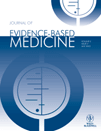
Journal of Evidence Based Medicine
Scope & Guideline
Connecting Evidence to Practice for a Healthier Tomorrow
Introduction
Aims and Scopes
- Evidence Synthesis and Meta-Analysis:
The journal publishes studies that conduct systematic reviews and meta-analyses, aiming to synthesize existing research to inform clinical guidelines and decision-making. - Methodological Innovations in EBM:
There is a strong emphasis on developing and refining methodologies used in evidence-based practice, including the GRADE system, network meta-analysis, and approaches to assess the quality of evidence. - Guideline Development and Implementation:
The journal addresses the creation and impact of clinical practice guidelines and explores the processes involved in translating evidence into practice, ensuring that health interventions are based on the best available evidence. - Shared Decision-Making:
A core focus area includes enhancing shared decision-making processes between clinicians and patients, emphasizing the importance of patient preferences and values in clinical contexts. - Addressing Health Inequities and Accessibility:
The journal also engages with issues of health equity, exploring how evidence-based practices can be implemented in diverse populations and addressing barriers to access. - Educational Strategies for EBM:
The journal promotes educational initiatives aimed at improving the teaching and understanding of evidence-based medicine among healthcare professionals and students.
Trending and Emerging
- Integration of Artificial Intelligence (AI) in EBM:
Recent publications are increasingly exploring the role of AI in enhancing evidence synthesis, risk assessments, and decision-making processes in healthcare, highlighting the potential for AI to streamline and improve EBM practices. - Focus on Health Technology Assessment (HTA):
There is a growing emphasis on health technology assessment, particularly in low- and middle-income countries, as the journal addresses the need for effective evaluation of new technologies and interventions. - Patient-Centered Care Models:
Emerging themes include the development of patient-centered care models, which prioritize patient preferences and shared decision-making, reflecting a shift towards more inclusive healthcare practices. - Environmental and Climate Health:
The journal is increasingly addressing the intersection of health and environmental issues, highlighting how climate change and sustainability impact health outcomes and evidence-based practices. - Rapid Evidence Reviews and Synthesis:
The trend towards rapid reviews in response to urgent health crises, such as the COVID-19 pandemic, showcases the need for timely evidence synthesis to inform immediate clinical and policy decisions. - Overdiagnosis and Low-Value Care:
Recent articles are focusing on the implications of overdiagnosis and identifying low-value care practices, aiming to reduce unnecessary interventions and improve healthcare efficiency.
Declining or Waning
- Traditional Randomized Controlled Trials (RCTs):
There is a noticeable decrease in publications solely focused on traditional RCTs without accompanying methodological innovations or discussions on their limitations, as the field shifts towards more complex and pragmatic trial designs. - Single-Intervention Studies:
The journal has seen a decline in the number of studies that investigate single interventions in isolation, moving instead towards studies that consider multifactorial approaches and real-world applications. - Basic Interventions and Non-Pharmaceutical Approaches:
There is a waning interest in basic non-pharmaceutical interventions that do not incorporate rigorous evidence synthesis or contextual factors influencing their effectiveness, indicating a preference for more comprehensive analyses. - Overly Technical Methodological Discussions:
Papers focusing excessively on technical details of methodologies without practical implications for clinicians or policymakers are appearing less frequently, as the journal emphasizes relevance and applicability.
Similar Journals

BMJ Evidence-Based Medicine
Driving Innovation in Clinical Medicine.BMJ Evidence-Based Medicine is a premier journal published by BMJ Publishing Group that focuses on the critical appraisal and application of scientific evidence in clinical practice. With its ISSN 2515-446X and E-ISSN 2515-4478, this impactful journal operates out of the United Kingdom and has established itself as a leading resource in the field of evidence-based medicine, reflected by its impressive Q1 ranking in the Medicine (miscellaneous) category and a significant 93rd percentile ranking amongst General Medicine titles on Scopus. Offering an essential platform for researchers, practitioners, and students alike, the journal disseminates high-quality research and reviews that significantly influence healthcare practices worldwide. The journal currently has access options available for readers through institutional subscriptions and individual licenses, making cutting-edge research easily accessible to those dedicated to advancing medical knowledge. With its commitment to evidence-based practice, BMJ Evidence-Based Medicine plays a crucial role in improving patient outcomes and informing clinical decisions.
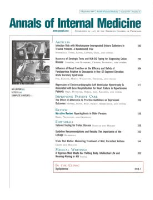
ANNALS OF INTERNAL MEDICINE
Leading the Way in Internal Medicine DiscourseANNALS OF INTERNAL MEDICINE, published by the American College of Physicians, stands as one of the leading journals in the field of internal medicine, with an impressive impact factor that underscores its significance in academic discourse. Since its inception in 1945, this esteemed journal has maintained a steadfast commitment to publishing high-quality research that spans a broad spectrum of internal medicine, making substantial contributions to clinical practice and health policy. With a current ranking of #5 out of 167 in the field of Internal Medicine and a remarkable 97th percentile ranking in literature, the ANNALS OF INTERNAL MEDICINE is recognized as a vital resource for researchers, healthcare professionals, and students alike. Although it operates under a traditional subscription model, the journal continually emphasizes the importance of disseminating robust clinical trials, systematic reviews, and expert commentaries that advance medical knowledge and practice. Its quartile rankings in Q1 for both Internal Medicine and Miscellaneous Medicine highlight its role in shaping the future of healthcare through rigorous and impactful scientific inquiry.
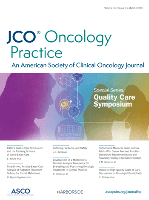
JCO Oncology Practice
Driving Change in Cancer Care Through Policy and PracticeJCO Oncology Practice is a premier peer-reviewed journal published by Lippincott Williams & Wilkins, specializing in the intersection of oncology and health policy. Established as a vital resource since 2020, this journal serves as a platform for the dissemination of innovative research, policy analysis, and clinical practice advancements aimed at enhancing cancer care. With its impressive impact factor and recognition in the top quartile (Q1) across multiple categories including Health Policy and Oncology, JCO Oncology Practice ranks #3 in Oncology Nursing and consistently shares cutting-edge insights that drive improvements within the field. The journal is accessible to a broad audience through its open access options, ensuring that vital knowledge reaches practitioners, researchers, and students alike. By prioritizing the latest evidence-based practices and addressing contemporary challenges in cancer treatment, JCO Oncology Practice plays an essential role in shaping the future of oncology practice and policy in the United States and beyond.

Systematic Reviews
Bridging research and practice for better health outcomes.Systematic Reviews is a leading open-access journal published by BMC, focused on the comprehensive and systematic analysis of health-related literature. Established in 2002, the journal has significantly contributed to the field of Medicine (miscellaneous) and has been recognized as a Q1 journal in the 2023 category quartiles, ranking 48 out of 398 in its field with an impressive 88th percentile on Scopus. With its open-access model initiated in 2012, Systematic Reviews ensures that vital research findings are freely available to researchers, practitioners, and students worldwide. The journal aims to publish high-quality systematic reviews that inform clinical guidelines, healthcare decisions, and policy-making, contributing to evidence-based practice in medicine. Located in the United Kingdom, it serves as an essential resource for advancing knowledge within the global health community, encouraging rigorous research methodology and facilitating the dissemination of impactful findings.

Journal of Research in Nursing
Transforming Nursing Practice Through Scholarly ContributionsJournal of Research in Nursing, published by SAGE Publications Ltd, is an esteemed academic journal housed in the United Kingdom that has been at the forefront of nursing research since its inception in the mid-1990s. With its robust focus on innovative research and theoretical foundations in the nursing discipline, the journal has achieved a prestigious Q1 ranking in the category of Research and Theory in 2023, underscoring its critical role in advancing nursing science. The journal's Scopus ranking is equally impressive, holding the top position in its category with a remarkable 97th percentile. It serves as an essential hub for scholars, practitioners, and students alike, aiming to disseminate cutting-edge findings and foster dialogue among the nursing community. While it currently operates under a subscription model, the journal’s commitment to academic excellence and significant contributions to nursing education and practice make it indispensable reading for anyone engaged in the field.
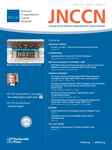
Journal of the National Comprehensive Cancer Network
Leading the Fight: Uncovering Breakthroughs in Cancer ResearchThe Journal of the National Comprehensive Cancer Network (ISSN: 1540-1405, E-ISSN: 1540-1413) is a premier publication in the field of oncology, established by HARBORSIDE PRESS and running since 2003. This highly respected journal holds a remarkable Q1 ranking in both Medicine (Miscellaneous) and Oncology categories, showcasing its significant influence and contribution to cancer research, with a Scopus ranking placing it within the top 5% of its field (Rank #20 out of 404). Aimed at a diverse audience including researchers, clinicians, and students, the journal publishes a wide range of articles that explore cutting-edge findings, clinical practices, and evidence-based guidelines in cancer care. With its commitment to advancing the understanding and treatment of cancer, it serves as a vital resource for professionals dedicated to improving patient outcomes. Although it does not currently offer open access, its impactful content continues to be a cornerstone for anyone involved in oncology research and practice.
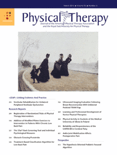
Physical Therapy
Exploring New Frontiers in Rehabilitation and Sports Therapy.Physical Therapy is a leading journal in the field of rehabilitation sciences, published by Oxford University Press Inc. Renowned for its rigorous peer-reviewed articles, the journal covers a broad range of topics within physical therapy, sports therapy, and rehabilitation, making it a vital resource for researchers, clinicians, and students. With an impressive impact factor and ranking—Q1 in its category (Physical Therapy, Sports Therapy and Rehabilitation) and ranked 19 out of 247 in Scopus—this journal stands at the forefront of advancing knowledge and practice in this vital health discipline. The journal has maintained its dedication to publishing original research, systematic reviews, and clinical studies since its inception in 1964, contributing significantly to evidence-based practices in the field. With a commitment to enhancing patient care and fostering professional development, Physical Therapy remains an essential platform for the dissemination of cutting-edge research and innovative therapeutic techniques.

Research Synthesis Methods
Elevating Educational Research through Rigorous SynthesisResearch Synthesis Methods, published by WILEY, is a prestigious journal dedicated to advancing the methodologies of research synthesis within the field of education. With a commendable impact factor that places it in the Q1 category, ranked #10 out of 1543 in the Scopus ranking for Social Sciences _ Education, this journal serves as a critical resource for researchers, professionals, and students alike. By focusing on innovative approaches to synthesizing research findings, Research Synthesis Methods fosters excellence in the evidence-based educational landscape. Although not an open-access journal, it provides various subscription options to ensure access for stakeholders. Launched in 2010 and ongoing until 2024, it continues to play a vital role in shaping research practices and enhancing educational outcomes.
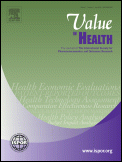
VALUE IN HEALTH
Transforming Insights into Impact for Global HealthVALUE IN HEALTH, published by Elsevier Science Inc, is a premier peer-reviewed journal in the fields of Health Policy, Medicine, and Public Health. With an impressive impact factor reflecting its respected standing, the journal has achieved a distinguished Q1 classification in multiple categories, placing it among the top publications in the health domain. Since its inception in 1998, this journal has been a vital platform for disseminating research that informs health policy and practice, impacting both clinical and public health decision-making. The journal’s Scopus rankings further underscore its global influence, with notable positions in Medicine and Public Health sectors. VALUE IN HEALTH is committed to fostering an environment where innovative research meets practical application, ultimately aiming to enhance health outcomes worldwide. Researchers, professionals, and students alike are encouraged to explore the wealth of knowledge contained within its pages.

HEALTH TECHNOLOGY ASSESSMENT
Illuminating the path to effective health technology solutions.HEALTH TECHNOLOGY ASSESSMENT is a prestigious open-access journal published by the NIHR Journals Library, focusing on advancing the science of health technology assessment through robust research and critical analysis in the fields of Health Policy and Medicine. Since its inception in 2001, this journal has fostered a multidisciplinary approach to evaluating health technologies, offering invaluable insights to researchers, healthcare professionals, and policymakers. With an impressive Q1 ranking in both Health Policy and Medicine (miscellaneous) for 2023, it stands at the forefront of academic discourse, reflecting a high-impact factor and an esteemed reputation within its respective categories. The journal not only publishes original research articles, but also reviews and case studies that illuminate the complexities of health technology in real-world applications. Established and based in the United Kingdom, HEALTH TECHNOLOGY ASSESSMENT strives to encourage evidence-based decision-making, making it an essential resource for anyone committed to enhancing healthcare outcomes through innovative technology assessments.